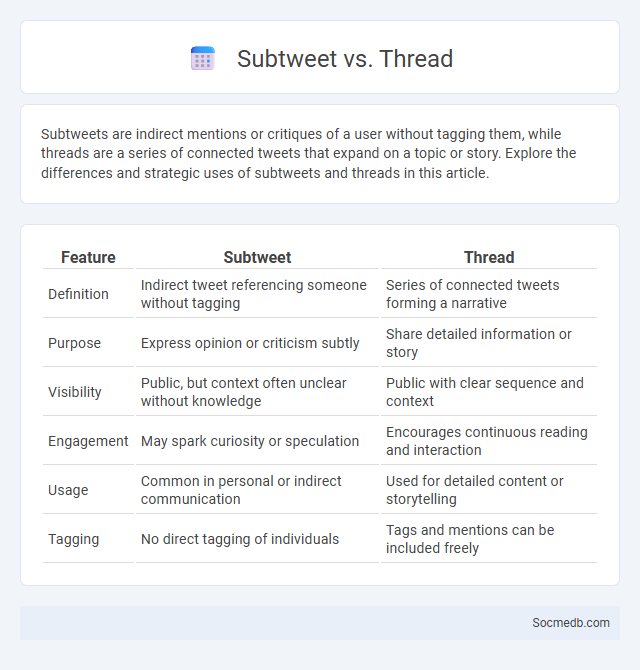
Photo illustration: Subtweet vs Thread
Subtweets are indirect mentions or critiques of a user without tagging them, while threads are a series of connected tweets that expand on a topic or story. Explore the differences and strategic uses of subtweets and threads in this article.
Table of Comparison
| Feature | Subtweet | Thread |
|---|---|---|
| Definition | Indirect tweet referencing someone without tagging | Series of connected tweets forming a narrative |
| Purpose | Express opinion or criticism subtly | Share detailed information or story |
| Visibility | Public, but context often unclear without knowledge | Public with clear sequence and context |
| Engagement | May spark curiosity or speculation | Encourages continuous reading and interaction |
| Usage | Common in personal or indirect communication | Used for detailed content or storytelling |
| Tagging | No direct tagging of individuals | Tags and mentions can be included freely |
Introduction to Subtweet, Thread, and Quote Tweet
Social media platforms like Twitter utilize features such as subtweets, threads, and quote tweets to enhance user engagement and communication. A subtweet involves indirectly mentioning a user without tagging them, often to comment subtly or criticize without direct confrontation. Threads enable users to connect multiple tweets for detailed storytelling or elaboration, while quote tweets allow users to share another tweet alongside their own commentary, facilitating broader context and interaction.
Defining a Subtweet: Meaning and Usage
A subtweet refers to a Twitter post that indirectly addresses or criticizes someone without mentioning their username, often used to express opinions or frustrations discreetly. This form of communication enables you to share thoughts about a person or situation while maintaining ambiguity, which can spark curiosity or tension among followers. Understanding subtweets helps in navigating social media dynamics and recognizing subtle messages within online interactions.
What is a Thread? Structure and Purpose
A thread on social media is a series of connected posts or messages that follow a single topic or conversation, allowing users to share detailed information beyond character limits. Each post in a thread builds upon the previous one, creating a structured narrative or discussion that enhances clarity and engagement. Threads are designed to facilitate storytelling, explain complex ideas, or provide step-by-step updates within platforms like Twitter or Reddit.
How Subtweets Differ from Threads
Subtweets are indirect social media posts referencing someone without tagging them, creating a layer of subtlety and ambiguity often used for passive-aggressive comments. Threads consist of a series of connected posts by the same user, designed to provide detailed explanations or narratives in a structured format. Unlike threads, which focus on continuity and expansion of ideas, subtweets emphasize implicit communication and indirect engagement within social networks.
Subtweet vs Quote Tweet: Key Distinctions
Subtweets allow users to indirectly reference someone without tagging them, often to express criticism or sarcasm privately within their follower base, while quote tweets explicitly share another's tweet with added commentary, tagging the original poster. Your understanding of subtweeting helps navigate nuanced social interactions on platforms like Twitter, avoiding direct confrontation. Quote tweets foster transparent conversations by amplifying the original content, making them essential for public discourse and digital engagement strategies.
Why Users Choose Subtweets Over Threads
Users choose subtweets over threads to communicate indirectly, allowing for discretion while addressing sensitive or controversial topics. Subtweets enable sharing opinions without explicit mentions, reducing potential backlash or confrontation. This subtle form of engagement often sparks curiosity and interaction among followers who decode the implied messages.
Advantages and Disadvantages of Subtweets
Subtweets allow users to express opinions or criticisms indirectly, enabling subtle communication without naming individuals, which can preserve social harmony and reduce direct confrontation. However, subtweets often cause misunderstandings and fuel gossip, as the ambiguous nature of the message can lead to speculation and unnecessary conflicts among followers. The balance between expressing feelings covertly and maintaining transparency is crucial in managing social media relationships effectively.
Threads: Benefits and Limitations
Threads offers a seamless and real-time platform for intimate conversations, enhancing communication among close-knit groups through organized topic-based discussions. Its integration with Instagram allows users to share multimedia content effortlessly while maintaining privacy controls and minimized distractions compared to broader social media platforms. However, Threads faces limitations such as a smaller user base leading to less content diversity and lower discoverability, potentially restricting engagement beyond immediate friends.
Common Scenarios: When to Use Each Format
Social media formats vary based on content goals and audience engagement; Stories are ideal for time-sensitive updates and behind-the-scenes glimpses, while posts suit evergreen content and detailed information sharing. Videos excel in capturing attention and driving engagement through dynamic storytelling, whereas images work best for quick impact and visual appeal. Live streams foster real-time interaction, perfect for Q&A sessions, events, and building community connection.
Conclusion: Choosing the Right Twitter Feature
Selecting the right Twitter feature depends on your specific goals, whether it's increasing engagement with Twitter Spaces, driving website traffic through Twitter Cards, or enhancing brand visibility via Twitter Ads. Understanding your audience's preferences and behaviors will maximize the effectiveness of features like Fleets, Polls, or Threads. Prioritizing features aligned with clear objectives ensures a strategic approach to social media marketing on Twitter.
 socmedb.com
socmedb.com